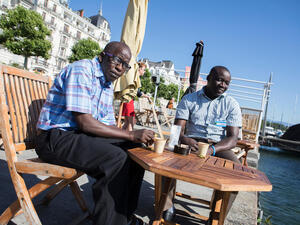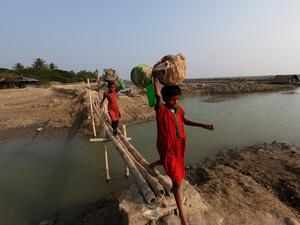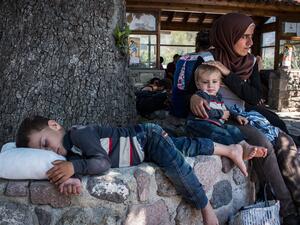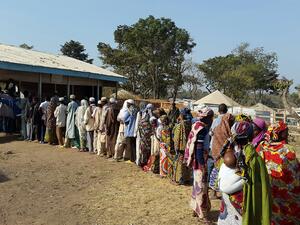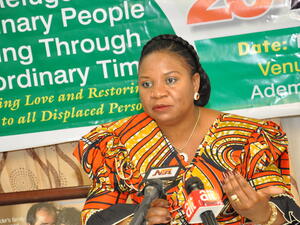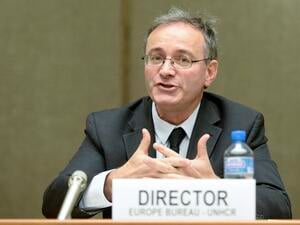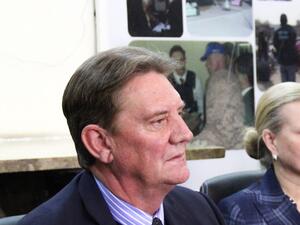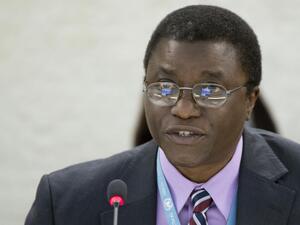Q&A: Iraq: A humanitarian operation that will go on for years
Q&A: Iraq: A humanitarian operation that will go on for years

Andrew Harper, senior operations manager for UNHCR’s Iraq support unit.
GENEVA, February 2 (UNHCR) - Former Australian diplomat, Andrew Harper, is the senior operations manager for UNHCR's Iraq support unit. A day after returning from his latest trip to Jordan, he discussed his work with Web Editor Leo Dobbs. Excerpts from the interview:
What is happening inside Iraq?
Unfortunately the indicators speak for themselves. At least 100 people being killed per day, hundreds more wounded and thousands more displaced both within Iraq and to surrounding states.... With the exception of the three northern governates, there is basically no place which is safe inside Iraq, particularly if you're from a minority, or if you are secular or come from a professional class.
Displacement is likely to continue for some time and UNHCR has to be prepared to deal with the results of this violence. This is not a short-term operation, this is an operation that is going to have to go on for years. And it's not going to be restricted to internal displacement inside Iraq. We're going to have to look at the consequences of displacement to Syria, Jordan, Egypt, Turkey, Iran and outside the region.
When did the situation start deteriorating?
The situation in Iraq has been deteriorating since the [1980-88] Iran-Iraq War.... The bombing [of a major Shia mosque last February] is the latest chapter.... The bombing triggered off what's becoming a sectarian nightmare. Since that date, the latest figures for IDPs inside Iraq is 640,000.... We are seeing thousands of people being displaced a day and this is not temporary displacement, this is probably permanent displacement.
We've got a vulnerable population which is being made even more vulnerable by the failing social sectors and social structures.... If the situation continues to deteriorate, we're going to see hundreds of thousands more displaced. UNHCR is predicting that if we say there's 1.8 million currently displaced in Iraq - that includes figures from before 2003 - then the total may rise to 2.3 to 2.7 million by the end of 2007. This is beyond the capacity of anyone to respond to.
What is UNHCR doing on the ground in Iraq?
UNHCR operations are restricted by the security situation. We've got 36 dedicated national staff inside Iraq and one international in Irbil.... The question is, what is the impact of UNHCR's operations in the south and centre of Iraq?.... There's about 43,000-45,000 refugees inside Iraq, which we have a core responsibility for. The majority of them are Palestinians, 15,000 are Palestinians, then you've got other refugees from Turkey and from Iran and from Syria.... The Palestinians and the Syrians have to be our main protection concern as they are being targeted by various militias and they are being continually threatened and killed on a weekly basis. There is basically nowhere that we can send them at the moment.
So it's very difficult for UNHCR to operate in-country?
It's very difficult for everyone.... We're planning to have an inter-agency workshop [in Geneva on February 22] to explore how we can work more effectively. At the moment our operations are managed from Amman and Kuwait.
In Iraq, we're planning to have a US$20 million programme this year and that includes provision of emergency non-food items and supporting legal assistance programmes. We're doing income generation activities where we have access ... we're providing accommodation where we can, support to a number of refugee locations such as the Palestinians, we're also providing rental subsidies, we're supporting a number of medical clinics, we're working through the [Iraqi] Ministry of Displacement and Migration to enhance their capacity to establish camps if necessary. The problem has been to ensure that we can target the most vulnerable groups and that we can ensure that we have sufficient monitoring without putting our national staff at undue risk .
We cannot afford to neglect Iraq, because Iraq and its humanitarian consequences are going to be a problem for the international community for years to come ... we have to find out ways how we can do our work, how we can collaborate with other agencies.
What is UNHCR doing in the surrounding countries?
There've been tens of thousands of Iraqis in these countries for a number of years. What has happened over the last 12 months is that there's been an increasing number of Iraqis crossing the border, particularly into Jordan and Syria. We don't have a clear idea of the exact number of Iraqis. It could be 500,000 in Syria and Jordan, it could be a million.... We have probably the world's largest urban refugee population and one of the constraints of dealing with an urban population is that they remain hidden.... The Iraqis are scared, they're living in basements. They're worried they may be deported.
There's some 45,000 who have registered with us in Damascus, there's another 21,000 Iraqis who have registered with us in Amman - obviously this is just a fraction of the total numbers. Why we have so few registered is because we have not been able to provide practical assistance or effective protection to date. What we are aiming to do in 2007 is change the way in which we work and to recognise that there's hundreds of thousands of vulnerable Iraqis in neighbouring states who are in need of effective protection and assistance.
We are in the stage now of increasing massively our capacity to register Iraqis and also to undertake resettlement referrals to those most in need. The target for this year is to register at least 200,000 Iraqis ... and to resettle as many as resettlement countries are willing to absorb.
In many aspects, UNHCR has to be the catalyst to wake up the international community to the magnitude, the severity of the population movement and to draw in international attention and assistance to support countries in the region.
Has UNHCR launched an appeal to donors for its Iraq-linked operations?
On January 6, we launched an appeal for US$60 million. It covers operations in Iraq, Jordan, Syria, Egypt, Lebanon, Turkey and Iran. Even US$60 million does not go very far when you are talking about the 1.8 million internally displaced, with another 2 million Iraqis who may be in neighbouring states, as well as building up our capacity to respond to future displacements. The money does not buy you much when you're trying to provide long-term protection and assistance to so many.
It's no use trying to fool ourselves that we are going to be able to address the total humanitarian needs with US$60 million. The total humanitarian needs are likely to be in the hundreds of millions, if not billions, of dollars.
You've just come back from Syria. Please tell us your impressions
My impression is that we can achieve our initial objectives. We can with the teams that we've got on the ground, if we give them the resources, if we give them the extra staff and we get the support from governments ... over the last few months we have acted promptly and effectively. In the first month of this year we've been able to sign agreements worth more than US$9 million with the Syrian authorities and we've been able to transfer those funds very quickly. We've been ordering 15 ambulances to assist because we need to demonstrate physical practical assistance as well.
The High Commissioner [António Guterres] is going to the region [Saudi Arabia, Kuwait, Jordan and Syria] on February 2, so that's another positive investment from UNHCR in the advocacy for displaced Iraqis and in trying to ensure that the humanitarian space is protected and enhanced in the region.
What else is UNHCR doing to try and bring movement on Iraq?
There's going to be a conference [in Geneva] on April 17. There are various objectives, but one is to ensure that we raise the profile on the displacement, that we draw attention to the needs of those displaced but also the needs of countries in the region. That we try and ensure that we move forward as part of a team and that we look at those groups who are most vulnerable as well - the situation of the Palestinians, for instance.
We've invited regional states - Iraq, Iran, Syria, Jordan, Turkey, the Gulf States, Saudi Arabia - major donor states, as well as states who have a specific interest in Iraq, as well as resettlement states. We're trying to be inclusive as possible, because the problem cannot be exclusive. We need to get as much support and buy-in as we can ... we need to get it.

